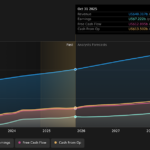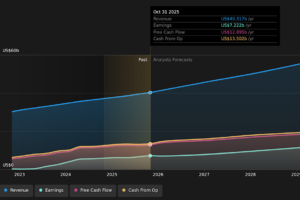
A customer pushes a full cart at a Walmart store in Burbank, California.
Patrick T. Fallon | Bloomberg | Getty Images
Walmart is set to report second-quarter earnings before the bell on Thursday.
Here’s what analysts are expecting, based on Refinitiv data:
- Earnings per share, adjusted: $1.22
- Revenue: $130.11 billion
- Same-store sales: up 2.1%
Additional tariffs on consumer goods set to take effect later this year remain a headache for Walmart, the largest retailer in the world. Earlier this week, some of the consumer-facing goods expected to be impacted by 10% tariffs on Sept. 1 were delayed until Dec. 15. Walmart already warned earlier this year that increased tariffs would lead to increased prices for customers. The company sources about two-thirds of its goods domestically, largely because of its massive food business. The remaining one-third of items comes from overseas, including from China.
Meanwhile, Walmart has been making changes to its e-commerce operations, moving to integrate its Jet.com team with members back at its Bentonville, Arkansas, headquarters. The company has faced internal pressures as frustrations are mounting over some of the cash Walmart has been throwing at its digital business, led by Marc Lore, to keep pace with Amazon. It’s been investing in rolling out next-day delivery and incubating more private label brands.
Walmart is expected to have seen a boost around Amazon’s 48-hour Prime Day event this July, which could show up in this earnings report. Gordon Haskett analyst Chuck Grom estimated that during the event Walmart saw about 14% of the visits that Amazon did.
“We believe value-orientated … retailers Walmart and Target are better positioned to capture share as shopper trends evolve,” Cowen & Co. analyst Oliver Chen said. “Meanwhile, department store players are getting squeezed and are working to quickly adapt to changing shopper preferences as physical traffic continues to decline.”
On Wednesday, stocks plunged, with the Dow Jones Industrial Average logging its worst performance of the year after the bond market flashed a troubling signal about the U.S. economy. Retail stocks also were spooked by a dismal earnings report from Macy’s that suggested conditions were worse for department stores than originally suspected. Macy’s fell to its lowest level since February 2010, while Nordstrom’s low was its worst since July 2009.
Walmart shares, valued at $305.5 billion, were more resilient, ending the day down 1.1%. The stock has gained 14% this year.
For fiscal 2020, Walmart has said it expects total sales on a constant-currency basis to be up 3%, with same-store sales in the U.S. growing between 2.5% and 3%, excluding fuel. E-commerce sales are forecast to grow 35%, less than the prior year. During the first quarter of fiscal 2020, e-commerce sales were up 37%.
This is a developing story. Please check back for updates.











